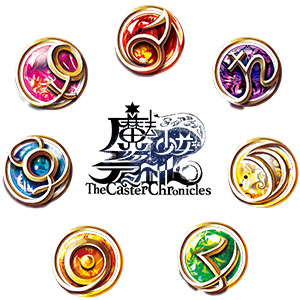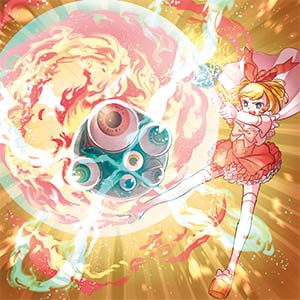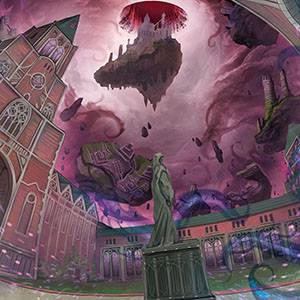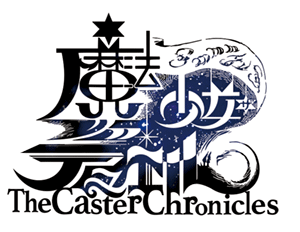Beginner's Guide
Building Your Own Deck
Before you can go about truly putting together your own deck and begin your foray into the world of The Caster Chronicles, you’ll want to familiarize yourself with the rules for deck construction that Caster Chronicles players need to abide by, if you haven’t done so already. Don’t worry, it’s pretty simple;
Simply put, your deck needs to consist of exactly 50 cards. You cannot go above or below this number, so make sure to really consider which cards are the most necessary for your strategy. You don’t want to waste valuable deck space on a card that’s only going to be useful in the most fringe of situations!
You may not have more than four copies of any card of the same name in your deck. This is true of every card in the game, except for caster cards. For casters you may not include more than four copies of a casters that have both the same name and the same level. For example you may have up to four copies of Passion Wing (Level 1) and up to four copies of Passion Wing (Level 2) in the same deck. Usually you’ll want to include four copies of most cards in your deck so you have the best chance possible of drawing them!
Deck building itself is somewhat a constant process as the landscape of the game is constantly changing, both due to the new cards being released and due to other players constantly changing their own decks.
Deckbuilding is best learned by hands on experience, but here are some guidelines to keep in mind;
Part of building a deck is testing it. You can come up with the greatest hypothetical ever, but until you know how consistent it is in reality, you can’t be certain. Always question how your deck can be better, and keep testing.
Even when you’ve finalized a deck list, that doesn’t mean it should never ever change. So you’ve completed your dream deck, but after playing with it, it seems like it isn’t doing that well. That means it’s time to revisit your deck. Always assess your deck’s strengths and weaknesses and experiment to see if you can improve upon your design.
Looking at online decklists is fine, but you shouldn’t make a habit of copying another’s deck simply because someone else says that its good. Building, questioning, and experimenting on your own is one of the best ways to build your skills at the game. Knowing what kinds of decks other people are using can be helpful to you in a myriad of ways, but it’s to your detriment not to build your own.
Accessories
While certainly not necessary, accessories can improve the quality and enjoyment of your games, and even if you choose not to use any, its likely your opponents will, so let’s go over some of the most common ones.
A deck box is pretty self explanatory. Its a box meant to, well, hold a deck. You can pick one up for fairly cheap at your local hobby shop. While it’s not required you keep your deck in a box like this, it’s certainly helpful. It makes sure your cards not only stay safe, but also neatly organized, so you’re ready to play as soon as you sit down.
Card sleeves are another popular item among players. Each sleeve is meant to hold and protect a single card. Card sleeves too, can be picked up on the cheap so long as you aren’t too picky about their design. Unlike deck boxes aren’t going to necessarily add any quality of life value to your games, though they will protect your cards from fraying after long repeated usage of them.
Dice are an accessory that’s quickly becoming a staple of the game. You may already even have a few! Since going second grants you the one time use coin for an extra aether of no element, a die is a great way to remember you have that! Dice are also handy to have around when needing to determine random elements, like who will go first in a game.
A pen and paper might be worth bringing too, if you really want to improve. Mark down what happened during a turn, write down play mistakes during the game so you can work on them later, write down weaknesses of your deck as you realize them.
Playmats are the last common accessory you’ll encounter. Playmats are neoprene (commonly) mats people lay over their game area when playing the game. Functionally they’re kind of like card sleeves, in that they protect your cards. They provide a safe, even, and clean surface for you to play on. But the big appeal is that they very often have high quality images on them, so people will try to get a playmat of their favorite character or the like. Playmats can be a bit more expensive than other accessories, so you may not want to invest in one right away, you certainly don’t need to after all. Playmats are very often prizes for tournaments, so if you’re feeling lucky you could try and win one rather than buy it outright.
Finding Tournaments
It’s perfectly fine to enjoy the game solely with your friends in a casual setting, but for those who are ready to take things into the competitive scene, let’s talk briefly about finding a tournament location near you.
There’s no ‘rotation’ of sets in The Caster Chronicles like there are in other games. Any card that isn’t banned is totally useable, so you don’t need to worry too much about not being able to use any cards you pick up.
Next there’s essentially two ‘levels’ of competitive play, what we’ll call the ‘local level’ and the ‘circuit level’. The local level comprises of smaller events, usually weekly tournaments held at various hobby stores and other such retailers across the world. If your local hobby store sells Caster Chronicles products, its very likely they also hold a tournament every week or so. These local events are the best way to get into the competitive scene as you’ll have the chance to play against new opponents at a location that is relatively closer than a large scale event, and you’ll be able to quickly make some new friends who’re also interested in the game! The circuit level is all the large official events hosted by Force of Will Co. (the company that makes Caster Chronicles). These events, referred to as Grand Prix (or GP) garner players from all over the country, competing at high levels for unique prizes. Since GPs are few and far between compared to the plethora of local events, you’ll want to make a good habit of attending local tournaments as often as you can to build up your skill in preparation for higher level events.
As for information about GPs, you can check the main page of the Caster Chronicles website for a direct link to all of the 2018 GP events, their locations, start times, prizes and any other information you’d want to know.
-

What's The Caster Chronicles?
Build a deck of cute magical girls and strange monstrous servants in a simple and exciting game.
-

Student Roster
Meet the casters of the academy.
-

Learn to play The Caster Chronicles
Learn the game basics and get acquainted with the cards.
-

Manual Download
Download the playsheet and playmat

